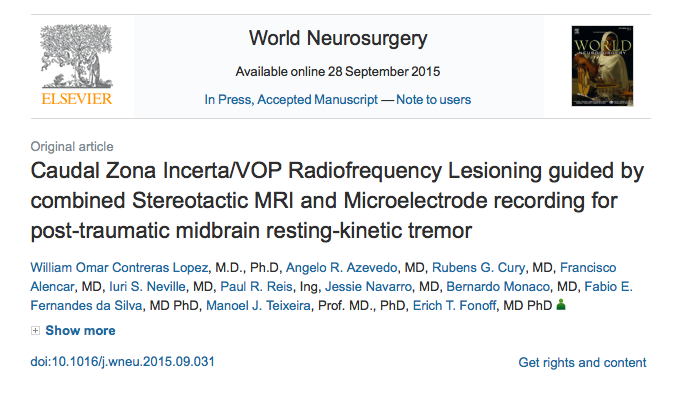Caudal Zona Incerta/VOP Radiofrequency Lesioning guided by combined Stereotactic MRI and Microelectrode recording for post-traumatic midbrain resting- kinetic tremor
Lopez WO, Azevedo AR, Cury RG, Alencar F, Neville IS, Reis PR, Navarro J, Monaco B, Fernandes da Silva FE, Teixeira MJ, Fonoff ET.
World Neurosurg. 2015 Sep 25. pii: S1878-8750(15)01194-8. doi: 10.1016/j.wneu.2015.09.031
OBJECTIVE:
Reporting the outcome of two patients who underwent unilateral ablative stereotactic surgery to treat pharmacologic resistant post-traumatic tremor (PTT).
MATERIALS AND METHODS:
We present two patients with ages 31 and 47-year-old respectively suffering from refractory PTT severely affecting their quality of life. Under stereotactic guidance, refined by T2 weighted MRI and double-channel multiunit microelectrode recording (MER), three sequential radiofrequency (RF) lesions were performed in the caudal zona incerta (cZi) up to the base of thalamus (VOP). Effects of cZi/Vop lesion were prospectively rated by tremor rating scale (TRS).
RESULTS:
Both patients presented intraoperative tremor suppression with sustained results up to 18 months follow-up, with improvement of 92% and 84% respectively on TRS. Tremor improvement was associated with enhancement functionality and quality of life of the patients. The patients returned to their work after the procedure. No side effects were observed up to the last follow up.results CONCLUSION: RF lesion of the cZi/Vop target was effective for posttraumatic tremor in both cases. The use of T2 weighted images and MER was found helpful in order to increase procedure's precision and safety, because it leads the RF probe by relying on neighbor structures based on thalamus and subthalamic nucleus.
CONCLUSION:
Copyright © 2015 Elsevier Inc. All rights reserved.
KEYWORDS:
Diffuse axonal injury; Forel´s fields; Micro Electrode Recording; Thalamotomy; Traumatic brain injury; Tremor; Zona incerta; ablative radiofrequency surgery; deep brain stimulation


